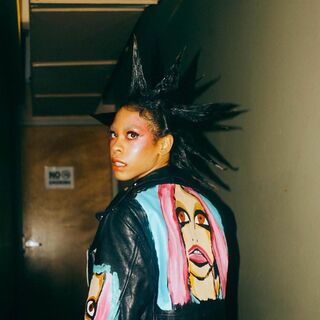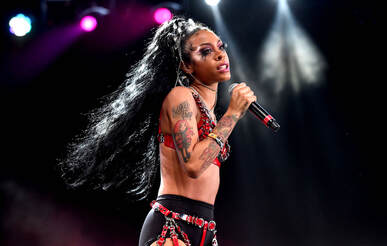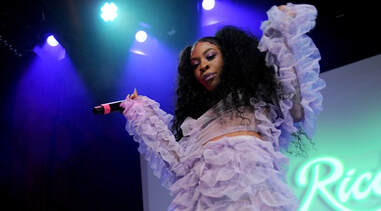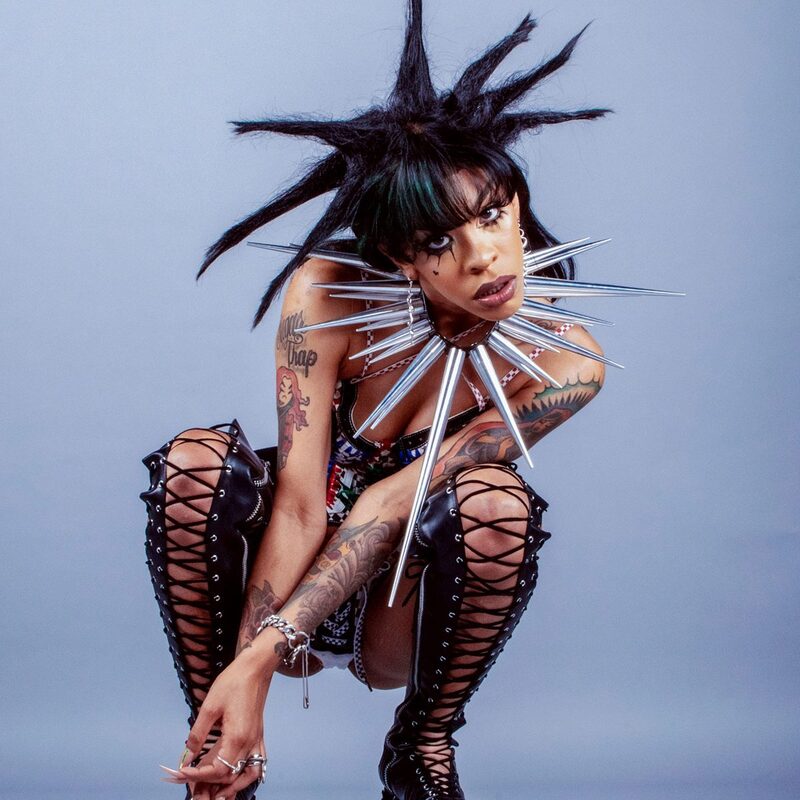"Punk to most is a community of those who share a mentality of nonconformity, rebellion, and individualism, everything that just being a Black woman and punk signifies." -Jadyn Polk

Rico Nasty is quickly making history as one of the best Black alternative artists of this generation with her bold statements in fashion, art, and music. Her footprint is imperative in the music industry and in the hearts of inspired Black youth everywhere as she continues to change the narrative on how Black people, in particular how Black girls, express themselves.
Rico Nasty was born Maria Kelly on May 7th, 1997, in New York, but is now based in Los Angeles, California. Rico started developing her skills and portfolio as a rapper under the influence of her father, who was also a rapper that went by the stage name Bewarre. She was raised in Maryland in a poor community which, in an interview with “Pitchfork” news, is described as “a drug-ridden community where people recreationally smoked a substance called ‘water,’ a mixture of PCP and embalming fluid.” She was sheltered as well as possible by her mother from an environment with a notorious reputation for violence. Her parents, though divorced, still actively supported her career. She began to pursue her career following the birth of her child Cameron. After losing Cameron's father to an asthma attack, she was determined to make a career out of music to give her child a safer childhood than she had growing up. In raising this child she's also simultaneously inspiring people everywhere with her fearlessness and drive.
Her music is loud and her lyrics are raw, unapologetically expressing anger and confidence. Both attributes you don’t typically see in what are portrayed as successful Black women, due to the narrative pushed that Black women must act refined and quiet in order to be deemed appropriate or professional.
Using a base of hip-hop combined with metal, rock, and punk elements, she truly bends the fabric of what we know to be the hip-hop genre. Her first album, Tales of Tacobella, was released in 2017, and she started to gain popularity after releasing the following album, Sugar Trap 2, later that year. She first blew up in 2018 in collaboration with Kenny Beats on her single “Smack a B*tch,” racking up 15 million views within the first year of release and 47 million by 2022. In this song she talks her mess, backing it up saying, “I don't need your opinion. Do what I f***kin’ want.” She does not bend her lyrics to make herself more presentable for audiences that may find her uncomfortable.
Black women in media are rarely portrayed truthfully, and are more often a curated combination of different stereotypes to entertain white audiences. The stereotype that Black women are fundamentally angry and hostile, is humorous because the world has given Black women every reason to be angry. However, this stereotype was allowed to flourish because those who filter mainstream media are white, and determine the white supremacist narrative of Black people being portrayed. In an article written by the Washington Post in collaboration with Essence,they conducted a study on Black women's portrayal in the media, where the solution to combat the angry stereotype was to “uplift images in the ‘invisible middle.’' Those include figures such as, “the acculturated girl next door,” “community heroines,” “young phenoms,'' and “modern matriarchs.'” All of these solutions seem to be to painting Black girls into the same roles that white women and girls have been depicted as. There is no way to truly encapsulate all Black girls, because we’re human beings, not indistinguible caricatures. The solution is allowing Black girls to express themselves and portray themselves in media unfiltered, in a humanizing way and not for the entertainment of white audiences. Which puts more emphasis on the importance in the way way Rico expresses herself, it’s crucial representation for Black girls who have been told to repress themselves in order to fit into white establishments and systems. Ideally she’ll inspire others to question the line between what is truly wrong, and what are culturally imposed norms meant to restrict Black women from reaching places of power. With that important lesson, it must also be taught that we are still living under these white establishments. Hopefully artists like Rico will empower more Black youth to speak up, vouch for themselves, and vouch for how they deserve to be treated.
Rico Nasty was born Maria Kelly on May 7th, 1997, in New York, but is now based in Los Angeles, California. Rico started developing her skills and portfolio as a rapper under the influence of her father, who was also a rapper that went by the stage name Bewarre. She was raised in Maryland in a poor community which, in an interview with “Pitchfork” news, is described as “a drug-ridden community where people recreationally smoked a substance called ‘water,’ a mixture of PCP and embalming fluid.” She was sheltered as well as possible by her mother from an environment with a notorious reputation for violence. Her parents, though divorced, still actively supported her career. She began to pursue her career following the birth of her child Cameron. After losing Cameron's father to an asthma attack, she was determined to make a career out of music to give her child a safer childhood than she had growing up. In raising this child she's also simultaneously inspiring people everywhere with her fearlessness and drive.
Her music is loud and her lyrics are raw, unapologetically expressing anger and confidence. Both attributes you don’t typically see in what are portrayed as successful Black women, due to the narrative pushed that Black women must act refined and quiet in order to be deemed appropriate or professional.
Using a base of hip-hop combined with metal, rock, and punk elements, she truly bends the fabric of what we know to be the hip-hop genre. Her first album, Tales of Tacobella, was released in 2017, and she started to gain popularity after releasing the following album, Sugar Trap 2, later that year. She first blew up in 2018 in collaboration with Kenny Beats on her single “Smack a B*tch,” racking up 15 million views within the first year of release and 47 million by 2022. In this song she talks her mess, backing it up saying, “I don't need your opinion. Do what I f***kin’ want.” She does not bend her lyrics to make herself more presentable for audiences that may find her uncomfortable.
Black women in media are rarely portrayed truthfully, and are more often a curated combination of different stereotypes to entertain white audiences. The stereotype that Black women are fundamentally angry and hostile, is humorous because the world has given Black women every reason to be angry. However, this stereotype was allowed to flourish because those who filter mainstream media are white, and determine the white supremacist narrative of Black people being portrayed. In an article written by the Washington Post in collaboration with Essence,they conducted a study on Black women's portrayal in the media, where the solution to combat the angry stereotype was to “uplift images in the ‘invisible middle.’' Those include figures such as, “the acculturated girl next door,” “community heroines,” “young phenoms,'' and “modern matriarchs.'” All of these solutions seem to be to painting Black girls into the same roles that white women and girls have been depicted as. There is no way to truly encapsulate all Black girls, because we’re human beings, not indistinguible caricatures. The solution is allowing Black girls to express themselves and portray themselves in media unfiltered, in a humanizing way and not for the entertainment of white audiences. Which puts more emphasis on the importance in the way way Rico expresses herself, it’s crucial representation for Black girls who have been told to repress themselves in order to fit into white establishments and systems. Ideally she’ll inspire others to question the line between what is truly wrong, and what are culturally imposed norms meant to restrict Black women from reaching places of power. With that important lesson, it must also be taught that we are still living under these white establishments. Hopefully artists like Rico will empower more Black youth to speak up, vouch for themselves, and vouch for how they deserve to be treated.

We’ve established that Rico Nasty is amazing because she breaks the narrative of how Black women express themselves, but it’s nothing abnormally new if you look at Black women in the music industry. Black women have been changing the narrative about women being sex forward in music, which is exactly why “WAP”, feat. Cardi B and Megan the Stallion got the traction it received, breaking the record for the biggest 24hr debut for an all-female collaboration, racking over 26 million views in that span. What makes Rico Nasty different is the way she does this. Rico’s punk fashion, with chokers, spiked and dyed hair, is not something you see in the media because “Black girls aren’t punk.”
If you google “punk” you’ll see pictures of white men, probably yelling something, who look unshowered, wearing clothing and make up that some deem socially unacceptable. But the point of being punk is to not care, punk was developed as a mindset. Punk to most is a community of those who share a mentality of nonconformity, rebellion, and individualism, everything that just being a Black woman and punk signifies. However, there is an extreme lack of Black artist representation in alternative music in general. There are classics such as Jimi Hendrix, Tina Turner, Tracy Chapman, and Prince, but not nearly enough considering the origins of the alternative genre.
Punk is a subgenre that developed out of the 1960s rock scene. Rock originated from the 1940’s and 50’s jump blues, jazz, country, and boogie woogie, but the man who pulled it all together was Chuck Berry. By combining country guitar and rhythm and blues to make rock, Berry turned “Ida Red,”an old country song, into “Maybelline” with his electric guitar in 1955. By the end of that year a million copies of Maybelline had sold, with this music he reached an audience of white teenagers with money, who wanted music they could relate to. Berry, long past his teens, began to write music about driving, going to school, and dating to cater to his market, until his passing in March 2017. Because Berry marketed his music to a white audience, in a white dominated world, they then became the dominant face of the genre.
If you google “punk” you’ll see pictures of white men, probably yelling something, who look unshowered, wearing clothing and make up that some deem socially unacceptable. But the point of being punk is to not care, punk was developed as a mindset. Punk to most is a community of those who share a mentality of nonconformity, rebellion, and individualism, everything that just being a Black woman and punk signifies. However, there is an extreme lack of Black artist representation in alternative music in general. There are classics such as Jimi Hendrix, Tina Turner, Tracy Chapman, and Prince, but not nearly enough considering the origins of the alternative genre.
Punk is a subgenre that developed out of the 1960s rock scene. Rock originated from the 1940’s and 50’s jump blues, jazz, country, and boogie woogie, but the man who pulled it all together was Chuck Berry. By combining country guitar and rhythm and blues to make rock, Berry turned “Ida Red,”an old country song, into “Maybelline” with his electric guitar in 1955. By the end of that year a million copies of Maybelline had sold, with this music he reached an audience of white teenagers with money, who wanted music they could relate to. Berry, long past his teens, began to write music about driving, going to school, and dating to cater to his market, until his passing in March 2017. Because Berry marketed his music to a white audience, in a white dominated world, they then became the dominant face of the genre.

Though Rico puts her music under the category of “hip-hop'', as discussed earlier both her fashion and music are heavily influenced by punk and alternative cultures, which becomes so much more powerful when her music sends messages of self worth, confidence, and freedom of expression. Most notably on her Anger Management album with lines like “You guys are so strong and you don't even know it, people hate you ‘cause you’re different and focused. People hated me so I flipped it and turned my emotions into something ya’ll could sing to…” And on her Nasty album with lines like “And I’m screamin,’ f*ck Trump, Black girls, stand up” and “B*tch, I’m nasty and I don’t give a f*ck. Like what is classy?” Rico’s expression is something every Black girl should witness and something everyone should notice and appreciate for her boundary breaking messages. Hopefully, Rico will continue to influence media and continue to inspire other Black artists so Black youth have more representation of themselves anywhere they feel most comfortable and confident.
Some of the my personal favorite Rico Nasty songs:
“Countin’ Up”
“Rage”
“Smack a B*tch”
“Cold”
“Sell Out”
“Poppin”
Some of the my personal favorite Rico Nasty songs:
“Countin’ Up”
“Rage”
“Smack a B*tch”
“Cold”
“Sell Out”
“Poppin”


